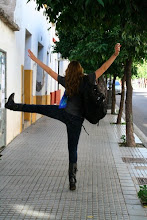Thinking about this semester-long class, one thing stands out in my mind: Until this class, I’ve never taken a course that centers on a literary genre where the genre itself wasn’t defined point-blank on the first day. At first, this seemed to be pretty frustrating and confusing, because I wasn’t really sure what I was looking for, what was important, etc. However, I think that in the end, it turned out to be a productive way to truly learn how to define a specific genre. Rather than memorizing a definition, it was something that I had to learn through my own reading experience with the help of guided lecture. In this way, I also feel confident that I’d be able to explain this genre* better because I had to fill in the blanks through my own experience.
As a point of criticism (which I think I may have mentioned in a previous blog entry), I think that this self-taught definition could be enhanced and refined through the addition of more texts that are truly considered to be magical realist texts. Now, I’m not suggesting that we should be reading more on top of what we already were assigned, but I think that maybe one of the texts which covers the build up to the magical realism could be replaced with short stories that fit in the genre. At the very least, it might be helpful to provide additional suggested texts that students can refer to if they still feel like they don’t fully understand what “magical realism” means/consists of [Side note: I lost the syllabus, so ignore the previous statement if these additional texts were included on that].
*Coming back to the idea of explaining the genre, something else that I never stopped to think about is that genres cannot be explained as something cut and dry. With magical realism, it is particularly easy to see, but even other movements that are considered to be pretty black-and-white cannot be so easily contained. Angel Flores points this out in one of the first articles written on magical realism in Latin American literature. He states that many literary critics attempt to classify novels and literary works in only one category, such as “romantic” or “naturalist,” not always taking into account that many works fall into multiple categories. In this way, Flores arrives at the idea that magical realism is, in itself a genre that depends on a balance of two “separate” genres.
